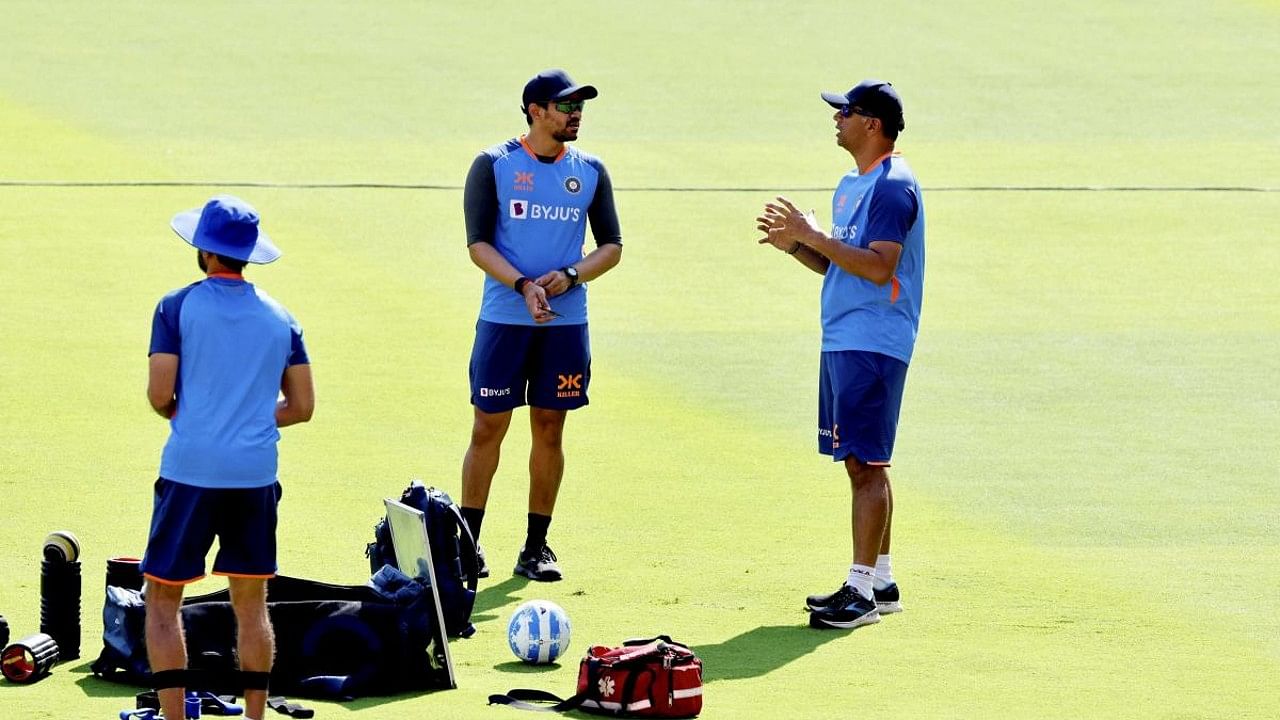
"Especially Jaddu (Ravindra Jadeja) yaar," said Rohit Sharma, part exasperated and part in jest, when asked about which among R Ashwin and Jadeja pestered him more for Decision Review System (DRS) referrals.
India didn't have the best of games in Indore overall, and they were particularly poor with their referrals, losing all three of them in Australia's first innings set the match up for the tourists. Jadeja was the culprit on the first two occasions when he persuaded Rohit to review on-field decisions against Usman Khawaja. Those horrible calls then dissuaded India from going upstairs in Ashwin's next over after the second review when the batsman (Marnus Labuschange) was actually out.
Also Read | Modi stadium set for grand finale
Australia would have been 38/2 had India reviewed but they didn't. The Aussie pair raised 96 runs for the second wicket, the biggest of the match.
"Every ball he thinks it’s out," Rohit continued. "I understand, they’re quite animated, it’s just the passion of the game, but that’s where my role comes in, to say 'bhai, relax a little, it’s okay...' If it’s at least ending up somewhere near the stumps, but this isn’t even hitting the stumps, and some balls were even pitching outside (leg stump). So that was a silly mistake that we made but we hope to correct that in this game and we’ll have a small chat regarding this as well, and hopefully we can get it right in this game."
DRS is quite challenging on the surfaces we have seen during the course of this Border-Gavaskar Trophy series so far. With variable bounce and sharp turns, you have to be precise in your judgement. While any bowler would think he has a wicket on every ball, the captain's job gets tricky.
"DRS, honestly, is like a lottery," Rohit said on a more serious note. "You get it right, you get it right, otherwise… You’ve just got to hope for the best. You’ve just got to understand certain aspects of DRS – pitching in line, impact in line, those kinds of things, because in India there’s not too much bounce, so not every ball that hits the pad, the bounce is going to be a factor, but it’s crucial to understand impact and pitching. Especially in the last game, it was turning a lot, so we had to look at three aspects – pitch in line, impact in line, and then how much the ball is turning.
"When we played in Delhi, it was not turning so much, so it was only the impact and probably the line where it pitched, whether it’s outside leg or in line. So that is how you assess, and that is what we try and do as well. When we played in Indore, we didn’t realise that it’s going to turn so much, so we quickly gathered our thoughts and we said, okay, this looks like it’s going to turn a bit, so we need to understand how much it turns and where the ball will eventually end up."
In Indore, Rohit revealed, the combination of skipper, wicketkeeper and bowler would confabulate and decide on whether to take DRS or not. But the inexperience of KS Bharat, for whom this is the first experience with DRS, discouraged the stumper from being decisive in conveying his opinion.
"What we decided at the start of the series is, the talk usually should be between the three of us – the bowler, the captain and the wicketkeeper – but obviously, the guys who are standing in close positions where they can hear the noise, where they can pick up certain things, they can also be involved. It’s not like it’s a three-way conference. But it’s a tricky one.
"Yes, we accept that we didn’t make the right calls in the last game, but Bharat obviously is new to DRS. He’s not kept wickets for India (he has in fact kept wickets as a replacement for the injured Wriddhiman Saha during New Zealand's first Test in Kanpur in 2021), so DRS is something very new. Ranji Trophy doesn’t have DRS, and India A and all of that doesn’t have DRS, so it’s something new for him as well. So we’ve just got to give him some time and make him understand what it is and all that," he explained.